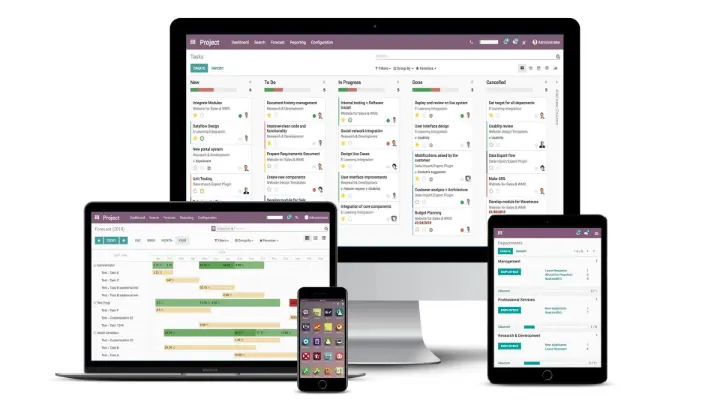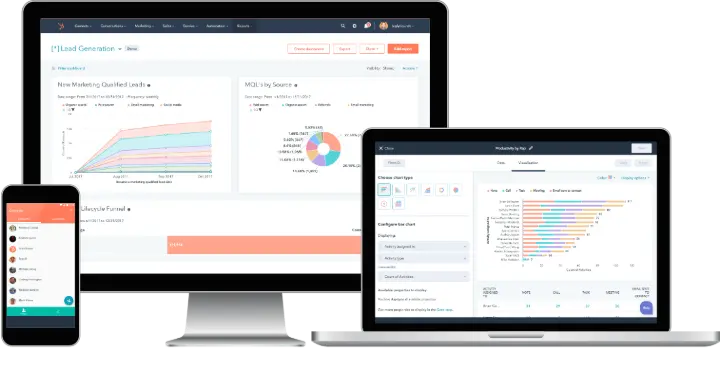Customer relationship management (CRM) systems are now essential tools for increasing customer happiness, boosting growth, and optimising internal operations in the fast-paced world of modern company. Odoo CRM and HubSpot, two prominent participants in this space, are frequently the subject of comparisons as companies assess which platform best suits their particular requirements. The main distinctions, advantages, and applications of Odoo CRM and HubSpot will be discussed in this article, along with the reasons why your decision should be based on whether you're looking for an ERP-centric or sales-focused platform.
Understanding Odoo CRM
The larger Odoo ERP ecosystem includes Odoo CRM. The open-source enterprise resource planning (ERP) programme Odoo, formerly known as OpenERP, unifies different corporate operations into a single, unified platform. Odoo's CRM module is made to work in unison with other Odoo applications, including project management, accounting, inventory, and human resources.
Odoo CRM's adaptability and extensibility are its main advantages. Businesses can start with the CRM and move into other areas as they grow because it is a component of a modular system. Because of this, Odoo CRM is especially appealing to businesses seeking a single platform to handle not only sales but all aspects of their operations.

Understanding HubSpot
In contrast, HubSpot is primarily a sales and marketing platform. Founded in 2006, HubSpot has become synonymous with inbound marketing, providing tools for email campaigns, lead nurturing, social media marketing, content management, and sales automation. Its CRM is built to improve customer engagement and sales performance, with a strong emphasis on contact management, pipeline management, and marketing automation. Unlike Odoo CRM, HubSpot is a cloud-native platform, meaning it was created from the ground up for the cloud. Its free CRM tier appeals to startups and small businesses who want to get started without having to make a significant upfront investment.

Comparing Features: Odoo CRM vs HubSpot
1. Sales Tools and Pipeline Management
Both Odoo CRM and HubSpot offer powerful sales tools, but they cater to slightly different user needs. HubSpot’s CRM is built with sales reps and marketers in mind, providing features like deal tracking, email sequencing, predictive lead scoring, and robust analytics. It’s designed to help sales teams close deals faster and track customer interactions across various touchpoints.
Odoo CRM distinguishes itself by enabling greater customisation, even if it provides similar sales features like pipeline management, opportunity monitoring, and automatic follow-ups. Because it's open-source, businesses may customise the system to fit their own workflows and integrate it closely with back-office tasks like supply chain management, purchasing, and invoicing, which HubSpot doesn't compete in.
2. Marketing Automation
HubSpot is a marketing powerhouse. It offers tools for email marketing, landing pages, blogs, social media scheduling, SEO, and analytics — all underpinned by its marketing hub. For companies heavily invested in inbound marketing strategies, HubSpot’s ecosystem is difficult to beat.
Odoo CRM includes marketing capabilities as well, but they’re not as advanced out-of-the-box compared to HubSpot. However, Odoo users can expand their marketing toolkit by adding Odoo Marketing Automation or Email Marketing apps, achieving a comparable but more customisable solution.
3. Integration and Extensibility
This is where Odoo CRM shines. As part of the Odoo ERP suite, it integrates natively with dozens of other modules, providing a centralised platform for virtually every business process — from manufacturing to eCommerce to HR. For businesses needing a comprehensive ERP solution alongside CRM, Odoo CRM is unmatched.
Although HubSpot lacks a native ERP component, it offers hundreds of connections and integrations through its marketplace, making it an excellent choice for third-party apps. Businesses must use external connections to link HubSpot with an ERP, which can be more complicated and expensive.
4. Customisation and Flexibility
Odoo CRM’s open-source foundation makes it highly customisable. Businesses with specific requirements can tailor workflows, design custom modules, and even develop new features. This makes it especially appealing to companies with complex or unique business processes.
HubSpot, being a proprietary cloud platform, is less flexible in this regard. While it offers robust out-of-the-box functionality, customisation is generally limited to the features provided within its tiers and integrations.
5. Pricing and Scalability
HubSpot’s freemium model is attractive to small businesses, but costs can quickly escalate as you move into its paid tiers and add-on hubs. For growing companies, HubSpot can become expensive, particularly when scaling across multiple departments.
Odoo CRM’s pricing is based on a modular approach. You pay for the apps you use, making it a cost-effective solution for businesses that want to start small and scale gradually. Additionally, being open-source, Odoo CRM offers the advantage of self-hosting, which can reduce long-term costs for companies with in-house IT capabilities.
Which Should You Choose?
If your business is heavily sales and marketing focused, with a strong emphasis on inbound marketing, HubSpot may be the better choice. Its ease of use, powerful marketing tools, and polished user experience make it a favourite among marketing and sales teams.
Odoo CRM, on the other hand, is the undisputed victor if you're searching for a system that can handle not only sales but the full range of corporate operations, from inventory and accounting to HR and production. Because of its ERP-centric methodology, it is perfect for companies looking for a unified, all-in-one solution that can expand with them.
Real-World Use Cases
Consider a digital marketing agency looking to manage leads, track campaigns, and optimise client interactions. HubSpot’s marketing and sales hubs, combined with its user-friendly interface, make it an ideal fit.
Contrast that with a manufacturing company needing to track raw materials, production schedules, logistics, and customer orders — all tied into their sales pipeline. Here, Odoo CRM offers unparalleled advantages by integrating seamlessly with the company’s ERP system, ensuring that every department works off the same data backbone.
Why Odoo CRM is Gaining Traction in Australia
The business environment in Australia is varied, ranging from retail and professional services to mining and agriculture. A versatile, ERP-integrated CRM, such as Odoo CRM, is quite beneficial for a lot of these sectors.
Australian companies value Odoo CRM's flexibility because it enables them to adhere to regional tax laws, reporting requirements, and particular industry requirements. Additional attraction is added by the option to deploy on-premises or in the cloud, which gives businesses more control over data security and sovereignty, two important factors in the Australian market.
Partnering with the Right Experts: Moonsun.au
Implementing Odoo CRM, upgrading an existing Odoo system, or customising modules requires expertise. This is where Moonsun.au, a trusted Odoo partner in Australia, comes in.
Moonsun.au specialises in Odoo implementation, guiding businesses through the entire process, from requirements analysis and system configuration to training and support. They also offer Odoo upgrades, ensuring that businesses stay up-to-date with the latest features and security enhancements. For companies looking to fine-tune their systems, Moonsun.au provides Odoo customisation services, tailoring modules to match unique workflows and business requirements.
With a deep understanding of both the Australian market and the Odoo ecosystem, Moonsun.au empowers businesses to unlock the full potential of Odoo CRM. Whether you’re a startup looking for a cost-effective CRM or an established enterprise needing a comprehensive ERP solution, partnering with Moonsun.au ensures a smooth, successful Odoo journey.
In conclusion, the choice between Odoo CRM and HubSpot boils down to your organisation’s priorities. For sales-focused, marketing-driven companies, HubSpot’s specialised tools provide a compelling offering. For businesses seeking an integrated, ERP-centric platform, Odoo CRM delivers unmatched versatility and depth — especially when implemented by experienced partners like Moonsun.au.
If you’re considering transforming your business processes with Odoo CRM, reach out to Moonsun.au to discover how their tailored services can help you achieve your goals.